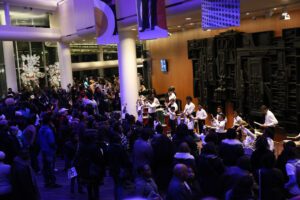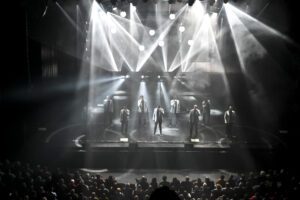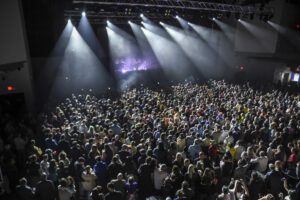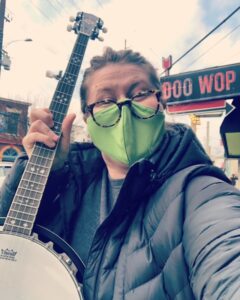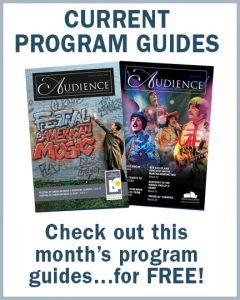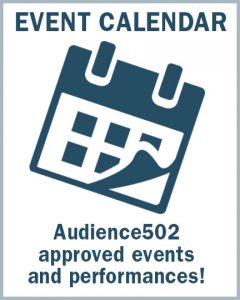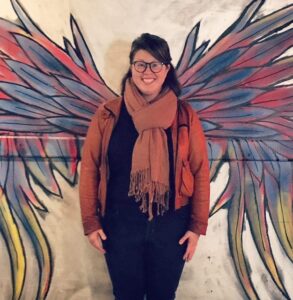 Kentucky Performing Arts is an important anchor in the arts and entertainment landscape in Louisville and throughout the Commonwealth. Its various performance halls and venues host an array of performances, concerts, comedians, and even presidential debates. In addition to the entertainment that happens on the stage, KPA also plays a role in education and outreach efforts that share the arts with children and adults in community centers, healthcare facilities and schools across Kentucky. In fact, KPA brings the arts to nearly all counties in the state, ensuring everyone can experience the wonders of the performing arts without barriers or restrictions.
Kentucky Performing Arts is an important anchor in the arts and entertainment landscape in Louisville and throughout the Commonwealth. Its various performance halls and venues host an array of performances, concerts, comedians, and even presidential debates. In addition to the entertainment that happens on the stage, KPA also plays a role in education and outreach efforts that share the arts with children and adults in community centers, healthcare facilities and schools across Kentucky. In fact, KPA brings the arts to nearly all counties in the state, ensuring everyone can experience the wonders of the performing arts without barriers or restrictions.
The work that happens behind the scenes to create and implement KPA’s programs is an endless task. Audience publisher, G. Douglas Dreisbach, caught up with Erin Palmer, KPA’s Senior Programming Manager, to talk about some of her roles and responsibilities and how she balances everything from artist communications to community programs around the state.
G. Douglas Dreisbach: What are some of your roles and responsibilities with KPA?
Erin Palmer: Well, traditionally, pre-COVID, my job involved a lot of the work that we would do to bring international and national touring artists to our community, not only to perform on our stages, but also to come into the community and connect with different organizations and individuals for relevant and meaningful experiences. That could be anything from a masterclass at YPAS to a comedy improv workshop with veterans as part of our Warrior Circle program.
In addition, I also work with a lot of our local artists to produce and support their work on our stages. We worked with everyone from Ben Sollee on our Kentucky USA program to Jecorey Arthur with our Voices of Kentuckiana, I really try to get to know the artists and their creative endeavors to become familiar with them so that we can support their work.
GDD: How have you had to adjust identifying where the need is, and what support you will be able to provide for the various programs?
EP: Well, we were lucky to be able to pivot quickly at the lockdown stage. At that time, we were working towards a lobby reopening from the fire of 2018, so we were very hopeful and excited that we had some receipts and funding from Brown-Forman to create a community reopening celebration of the lobby. Brown-Forman generously repurposed that funding for us to be able to start KPA At Home, which was our digital online series that featured artists from all over Kentucky and ran from April to July of 2020.
There has also been a lot of rescheduling and a lot of “Will we or won’t we?” moments, not only for us, but the whole industry. So, we were taking one step forward, taking one step back, and just being flexible to be able to do the dance and be ready when we can reopen.
We have also had a lot of communication, a lot of amazing partnerships, and a lot of creative thinking about how we can navigate this new world as we come into the spring and summer to find what opportunities there might be to work more outdoors.
GDD: Do you help with booking entertainment at KPA venues?
EP: I am part of the programming department that’s responsible for booking artists who call Louisville home as well as artists who tour nationally and internationally. So, the difference in our residence companies (except Broadway) and touring acts is that they are producing companies, so they’re actually building the shows from the ground up. Touring acts are a bit different, and we do straight commercial talent-buying, which is a different beast all together because it has a very quick turnaround. We can book a show and be on sale within three days for a show coming in about two months. So, that is one aspect of our booking.
We work about a year out to be able to secure those bookings, and that is a lot of what we are working on now. We are also working on the shows that were booked for the spring last year and going through the phases of rescheduling them. We just keep pushing them in different quarters of the year until we know we can officially say they are confirmed, and will be able to put them on sale to welcome audiences back to the theaters.
GDD: When booking entertainment, what are some of the characteristics you look for?
EP: It depends on where the show falls. If it’s more of a commercial show that tends to book very quickly, our team will usually get information from an agent, and we’ll share that with our marketing colleagues. After that, we will all talk about the market viability for the shows, past history in the market and in other areas, and running budgets. Also, artists always have riders listing what their production needs will be, what the artist hospitality needs are and all that kind of stuff. So, we calculate all those things into one sum, and that is where tickets might fall to meet the budget.
We also come to a determination on where we think we should land on the show, and if we should move forward or not. We use a lot of anecdotal information and utilize peer networks throughout the country to get a good feel of the artist before we commit. We have a network that we talk to daily to discuss dates, general industry topics and information on shows, and how they did in specific markets.
GDD: Do you look at cities that compare to Louisville to see if an act does well there?
EP: We have colleagues in Columbus, Cincinnati, and Cleveland, and we are in a lot of constant dialogue, not only because of similar market demographics, but also because of the routing opportunities. It’s always cheaper to have an artist go on a what we call a “good routed tour,” as opposed to coming to Louisville and then going to California and then going to South Carolina. If we can make it where it’s an easy travel route for the artist, it helps save costs across the board for everyone involved.
We talk to Ohio quite regularly, and we are also in a network that’s connected to New York, so we have markets that are in very different places. We talk to folks in Austin, in California, and other cities to get a general sense all around of how a show might have done at one place, and then also compare how the life of the show has performed to try to see where there are patterns that we can learn from.
On our programming, we bring in artists that will work with our community on and off of our stages. We look at relevance, as well. Is the performer a comedian who is going to come in make people laugh? So, there is a big entertainment value in there. They are building their relationship with the arts on the entertainment and the levity of that event. For a dance company, for instance, there are other markers that we look at. The program for one, the artist name recognition for another, and particularly with the program, how it fits the conversation at hand with our community.
For instance, we had the dance company Complexions come in November of 2019, and their main program was called WOKE. The program spoke to just that word and what it means, as far as racial inequality, equity, diversity, inclusion, and we were able to use that word as a foundation to build programs before and after the show. There were pre-show talks with Hannah Drake, and after the show Robert Curran from the Louisville Ballet did a Q&A session.
GDD: How do you feel the Kentucky Performing Arts programming fits into the Louisville arts ecosystem, especially with the downtown community and some of the revitalization of what has been lost with the pandemic and recent civil unrest?
EP: Well, the stark difference between us as a presenter and a producer is that our resident companies are bringing in and producing their work, and we help supplement or complement what they are doing with artists that are coming in. Most of these artists are coming to Louisville and dipping their toe in the same type of dialogue with their art that potentially our resident companies are. So, it enhances all the different topics that are being discussed by the arts with artists that are, for the most part, not from here. But we do celebrate and welcome that dialogue from the artists that are here, as well, and presenting them on our stages.
We really look to bring in diverse performances and events that support our mission, that support the heritage and arts of the commonwealth. We try to offer something for everyone, from comedy to dance to our Midnight Ramble series, that speaks to the history of the midnight shows in our African American community here in Louisville. And left-of-center programming, like the Second City coming back in, is really helping to complement what is going on with our resident companies and other arts organizations throughout the city, in addition to the outreach that we bring in. A lot of our colleagues, our resident companies, and other arts organizations are doing outreach, and we’re able to connect those artists who are coming to town with that work, which is really exciting, as well.
And as far as the revitalization of downtown, and from COVID — I think once we are able to open our doors again, people are going to be so hungry to come back into the theaters that it will be a natural revitalization. We are eager to be a part of the conversations going on in our city and offering outlets for the arts to be able to propel those conversations and challenge our audiences to have further dialogue and understanding to heal from what our city has experienced, not over the past year, but the past many, many years of our city’s history.
GDD: Are there any events that we can look forward to in the coming months?
EP: For the last few months, we have been doing streaming programs from artists around the country, and it has been a really lovely model. I will say, industrywide, I think something that is beautiful that did come out of this is just the partnerships between agents and promoters and venues. We have been lucky enough to be a part of these affiliate programs, where a portion of the tickets sold will support Kentucky Performing Arts. We have had everyone from The Blind Boys of Alabama holiday show, to Pink Martini, to Chevy Chase talking about Christmas Vacation, with a percentage of the proceeds coming to KPA. It’s been really exciting to be able to keep those lines of dialogue open, and we look forward to announcing more of those this spring.
We strive to partner with Louisville arts and community organizations in efforts to highlight their mission and really curate conversations, art exhibitions, and performances that speak to what they are doing and speak to what our city is going through. We partnered with groups like Louisville Urban League, and we highlighted their Polaroid project, where youth students used Polaroid cameras to take pictures of things that represented the COVID pandemic and the social unrest in our city. We then highlighted those on the big screen in Christy’s Garden, and then we were going to screen Good Trouble, the John Lewis documentary. However, the weather did not allow us to do so. So, that’s really exciting, and we’re going to continue that work in the spring in Christy’s Garden.
I am also looking forward to different options to be able to utilize, not only our own outdoor space at Christy’s Garden and Paristown Hall, but other outdoor spaces. And again, I cannot stress enough how amazing it has been to, not only industrywide, but here locally — to partner with so many organizations during this time. Everyone has just been so supportive, I think, of each other, to be able to find ways to make things work and to provide opportunities, safe opportunities, for our community. It’s just been so inspiring.
- Favorite music genre: Jazz, bluegrass and folk
- Favorite instrument: “I’m learning the banjo right now, so I guess that?”
- Musicians or bands you’re into now? Lucius. “I just love their harmonies.”
- Musicians or bands that you were into in your younger years? (Ie. high school, college, etc…) Female jazz vocalists like Dinah Washington, Ella Fitzgerald, Sarah Vaughan, Betty Carter. “All of those have been in my playlist for a long, long time. My family listened to a lot of Buddy Holly, so that was a big one.”
- Favorite place to watch a concert or a show? “Definitely our new venue, Old Forester’s Paristown Hall. For smaller venues, I like the base the basement at Decca.”
- Preferred music streaming platform? Spotify
For more information about Kentucky Performing Arts, visit KentuckyperfromingArts.org

